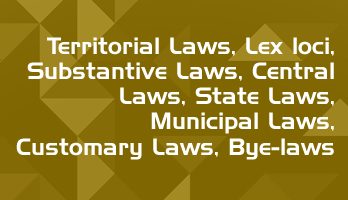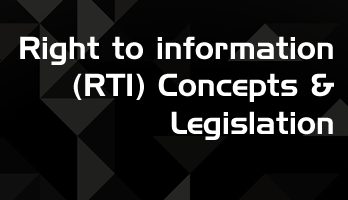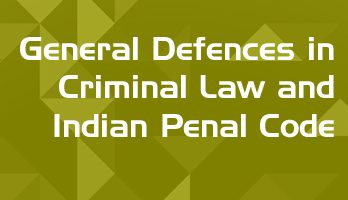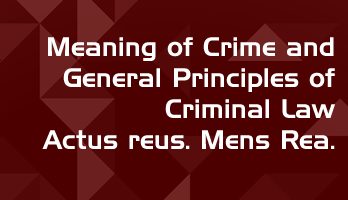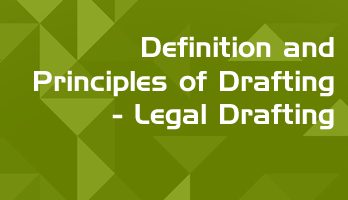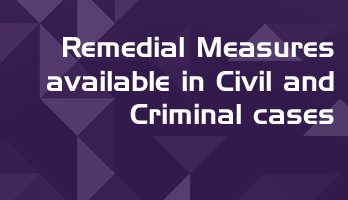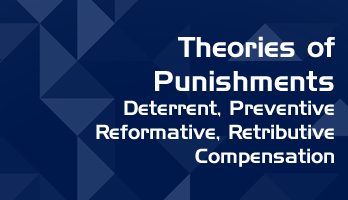Free Full Course Available on LawMint's YouTube Channel
How to Land Your Dream LLB Internship in a Top Law Firm
- Part 1 - Introduction
- Part 2 - Internship Planning
- Part 3 - Internship Research
- Part 4 - Building Your Profile
- Part 5 - The Email
- Part 6 - The Resume
- Part 7 - The Cover Letter
- Part 8 - The Interview
- Part 9 - Self Development
Practical and comprehensive course, with real examples and step-by-step analysis of the complete internship application process. Check out LawMint's YouTube channel now!
For a complete understanding of the concept of Law, it is necessary to understand the sources of law. ‘Source’, literally means a point, from which anything emerges, rises or emanates.
The expression ‘source of law’, therefore, means the source from where rules of human conduct came into existence and derive legal force of binding character.
Broadly, sources of law can be divided as follows :
1. Custom
‘Custom’ is the oldest and most important source of Law. ‘Custom’ is an embodiment of those principles which have commended themselves to the natural conscience as principles of justice and public utility.
‘Customs’ originate in frequent repetition of the same act, and therefore, denotes rules of habitual conduct within a community. Uniformity of conduct in like circumstances is, thus, the hallmark of the ‘Custom’.
Essentials of a Custom
To be valid source of Law, a customary practice must fulfill some requirements, of which following are the most important :
a. Antiquity
A ‘Custom’ to be recognized as a law must be proved to be in existence from time immemorial or from long time period.
b. Continuance
The second essential of a ‘Custom’ is that it must have been in practice continuously.
c. Reasonableness
A ‘Custom’ should not be unreasonable, i.e., it must be reasonable in its application to the circumstances of the individual cases. It must not be otherwise imprudent, harsh or inconvenient.
d. Obligatory Character
The ‘Custom’ must have obligatory force. It must have been supported by the general public opinion and enjoyed as a matter of right.
e. Certainty
A ‘Custom’ must be certain. A ‘Custom’ which is vague or indefinite cannot be recognized.
f. Consistency
Customary rules should show a consistency in observance of a practice. If a practice has not been consistently followed it cannot attain the status of a ‘Custom’.
g. Conformity with Statutory Law and Public Policy
A ‘Custom’ should be in conformity with a Statute Law and public policy.
2. Judicial Precedent
‘Precedent’ signifies a set pattern upon which future conduct may be based. It may be an earlier event, decision or action followed in parallel circumstances later. A ‘Judicial Precedent’ is an independent source of Law.
‘Stare Decisis’ is a Latin word which denotes ‘to stand by past decision or precedents and not to disturb the settled points.
Stare decisis is Latin for “to stand by things decided.” In short, it is the doctrine of precedent. Courts cite to stare decisis when an issue has been previously brought to the court and a ruling already issued.
Precedent or stare decisis denote employment of past judicial decisions as a guide for making of future ones for lower courts in hierarchy.
A ‘Judicial Precedent’ or ‘stare decisis’ has a binding force for the subsequent cases; however, it is not the whole judgment that is to be binding. In other words, every statement made by the judge in an earlier decision is not binding in future case. – Only those statements in an earlier decision which may be said to constitute the reason for the decision or ‘ratio decidendi’ of that case are binding as matter of general principle, in subsequent cases.
‘Ratio decidendi’ is a general principle which is used in a case. It is the rule of law upon which the decision is founded and it is authoritative in nature.
‘Ratio decidendi’ means the “rationale for the decision” – which are the main elements of a superior court’s judgment, which create binding precedent, and must therefore be followed by the lower courts.
Apart from ‘ratio decidendi’, a judgment may contain observations not precisely relevant to the issue before the Court.
These may be the observations upon the broader aspects of law or answer to the hypothetical questions raised by judges or counsels in the course of hearing. Such observations are ‘obiter dicta’ and without any binding authority, in so far as these are not essential to the decision reached.
Obiter dicta or Obiter dictum, refers to a judge’s comments or observations, on a matter arising in a case before him which does not require a decision. Obiter remarks are not essential to a decision and do not create binding precedent. However, obiter remarks of senior judges, for example, may be indirectly instructive or persuasive, especially in areas in which the law is developing.
3. Legislation
‘Legislation’ is a deliberate process of legal evolution which consists in the formulation of norms of human conduct in a set form through a prescribed procedure by agencies designated by the Constitution. ‘Legislation’ means to make rules for human conduct.
The term ‘Legislation’ is derived from the word ‘legis’ meaning ‘law and latum’ which means to make or set. Thus, the word ‘legislation’ means making of law. It is a source of Law which consists in declaration of legal rules by competent authority.
‘Legislation’ includes every expression of the will of the legislature, whether making law or not.
‘Legislation’ may also refer to the main law or ‘Act’, that is passed by the Central or State Legislature. e.g., Income Tax Act is a legislation passed by the Central Government.
‘Subsidiary legislation’ includes regulations, rules, by-laws, and codes made by competent authorities, under powers conferred by an Act. They are made under an Act and expand on or supplement the provisions of the Act. e.g., The Income Tax department may make various rules, within the power granted to it by the Income Tax Act.
In summary, the Act dictates what must be done, a regulation etc dictates how it is done.
Questions
Identify the different sources of ‘Law’.
Mainly, there are three different Sources of Law.
- Customs;
- Precedent; and
- Legislation.
Define ‘Custom’ and also identify the essentials of a valid ‘Custom’
‘Custom’ is the oldest and an important source of Law. It is embodiment of those principles which have commended themselves to the natural conscience as principle of natural justice and public utility.
The essentials of a ‘Custom’ are:
- Antiquity;
- Continuity;
- Reasonableness;
- Obligatory Character;
- Certainty;
- Consistency; and
- Conformity with statutory Law and Public Policy.
Define the term ‘Legislation’.
Legislation means to make law. It includes every expression of the will of the Legislature.
Article summary : For a complete understanding of ‘Law’, it is necessary to know the Sources from where it comes. Broadly speaking, Customs, Judicial Precedents and Legislation are the Sources, from where Law emerges.
Free Full Course Available on LawMint's YouTube Channel
How to Land Your Dream LLB Internship in a Top Law Firm
- Part 1 - Introduction
- Part 2 - Internship Planning
- Part 3 - Internship Research
- Part 4 - Building Your Profile
- Part 5 - The Email
- Part 6 - The Resume
- Part 7 - The Cover Letter
- Part 8 - The Interview
- Part 9 - Self Development
Practical and comprehensive course, with real examples and step-by-step analysis of the complete internship application process. Check out LawMint's YouTube channel now!
Acknowledgement : This article is adapted from Swayam – NIOS course materials.



